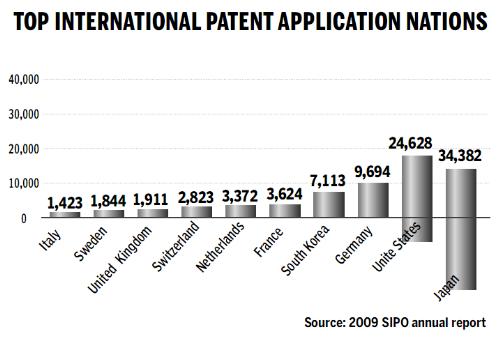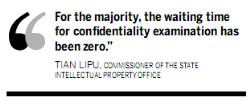
"A confidentiality screening is a common regulation in patent administrations in various nations," SIPO commissioner Tian Lipu said at a recent meeting to solicit opinions and suggestions from foreign embassies, overseas organizations and foreign-invested companies.
"It is not beyond international rules."
Since the amended patent law took effect in October, 2009, new and revised provisions have aroused concern among many foreign organization and investors.
Confidentiality clauses in the new patent law raised a barrage of questions from foreign participants.
The amended law requires entities and individuals to apply to a patent administration under the State Council and receive a confidentiality approval before filing an application on an overseas invention or utility model patent for works created in China.
Under the previous legal framework only Chinese applicants were subject to the confidentiality screen. The new amendment put all applicants for overseas patents under the same procedures without regard to nationality, said Dong Zheng, chief of the SIPO legal affairs division.
The purpose of the amending is to further standardize applications for foreign patents, forestall leaking of state secrets and protect major economic and social interests, Dong noted.
Inventions that affect national security will be administrated in accordance with the State Secret Law, she said.

Inventions and utility models subject to the new amendment are those that were primarily or materially created in the nation, Dong explained.
In the case of a joint project with participants from different nations, the key point is whether the major creative contribution came from China or abroad, rather than nationality of project participants.
Commissioner Tian noted that instead of the examination regulation itself - a globally common practice - foreign investors are more concerned about the confidentiality screen processing period, which might have an impact on establishing priority rights in patents.
Since the new law came into effect last October, more than 98 percent of applications for overseas inventions and utility models have been granted.
A large proportion of the remaining 1.3 percent are still being processed, Tian said. "Of those remaining, I believe that grant rate will surpass 50 percent."
"So the number of non-granted patents due to national security would be very limited," he said.
In addition, Tian cited processing efficiency to ease concerns about waiting time.Some 95 percent of applicants who filed applications for both patent and confidentiality examinations were granted the right to file overseas at the same time their domestic application were accepted.
"For the majority, the waiting time for confidentiality examination has been zero."
Most remaining applications still being processed will have results in two or three weeks, Tian said, with only a few that may last longer, yet still within the regulated time.
Processing efficiency is expected to further improve, he added.
SIPO holds such a meeting for briefing and exchange with foreign-related businesses and other organizations at least once a year. Fifty delegates from foreign organizations and multinationals attended the meeting this year.





